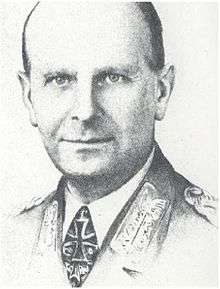Johann von Ravenstein
| Johann von Ravenstein | |
|---|---|
 Johann von Ravenstein | |
| Born |
1 January 1889 Strehlen |
| Died |
26 March 1962 (aged 73) Duisburg |
| Allegiance |
|
| Service/branch | Heer |
| Years of service | 1909–45 |
| Rank | Generalleutnant |
| Commands held |
5th Light Division 21st Panzer Division |
| Battles/wars |
World War II |
| Awards |
Pour le Mérite Knight's Cross of the Iron Cross |
Johann "Hans" Theodor von Ravenstein (1 January 1889 – 26 March 1962) was a German officer in the armed forces and held the final rank of Generalleutnant. He fought in the First and Second World Wars and was taken prisoner by New Zealanders at Point 175 during the Second World War. After his return to Germany in 1948 he was active in Duisburg as a director of traffic.
Family
Johann Theodor von Ravenstein was born in Strehlen into a military family. Among his ancestors was Johann Friedrich August von Ravenstein, who was an aide to Blücher at the Battle of Waterloo and received the Iron Cross.
Career
In 1909 Ravenstein joined the Grenadier-Regiment König Wilhelm I. Nr. 7 at Liegnitz. He transferred soon to the 7. West Prussian infantry regiment NR. 155 at Ostrowo, and was promoted to Lieutenant.
First World War
Ravenstein entered the First World War as a battalion adjutant officer and saw considerable action on the Western Front, participating in the battles of Verdun, the Somme, and the Champagne Offensive. In 1916 he received the Ritterkreuz des Königlichen Hausordens von Hohenzollern mit Schwertern. Altogether he was wounded three times. In the 1918 Spring Offensive Ravenstein commanded the 1st Battalion of the Füsilier Regiment von Steinmetz (West Prussian) Nr. 37. On 27 May 1918 his battalion broke through the opposing line at Soissons. After capturing the notorious Chemin des Dames, he succeeded, with 10 soldiers, to capture the bridge over the Aisne at Bourg intact. His troops took 1500 prisoners and captured 32 cannons. For this accomplishment Ravenstein received the Pour le Mérite.
On 31 March 1920 he left the army and attended a university, where he studied political science. Later he became an electrician in a company located in Duisburg and worked in the city administration. In 1934 he rejoined the army as a major attached to the 2nd Battalion of the 60th Infantry Regiment. On 1 October 1936 he was promoted to the lieutenant colonel and on 1 August 1939 to colonel.
Second World War
Ravenstein saw combat both in the Polish campaign (1939) and the Battle of France (1940), during which he received the Knight's Cross of the Iron Cross. After the invasion of Greece in April 1941 he was promoted to Generalmajor. From 20 May to 29 November 1941 he commanded the 21st Panzer Division in the Afrika Korps. He was taken prisoner on 28 November 1941 at Point 175 by New Zealander soldiers. (These New Zealanders were to become prisoners themselves the same day.) [1]
He first spent some time in the stop-over POW camp at Pietermaritzburg, Natal Province, in the Union of South Africa before departing for Canada. In Canada he was a POW from 1942 to 1947, first in Bowmanville, Ontario, then at Grandeligne, Quebec, then at Farnham, Canada. While there, he was promoted to Generalleutnant on 1 October 1943. He was transferred to Island Farm Special Camp 11, Bridgend, Wales, in June 1946 and was repatriated to Germany in November 1947. Johann von Ravenstein died on 26 March 1962 in Duisburg at the age of 74 years.
Awards
- Iron Cross (1914) 2nd and 1st Class
- Clasp to the Iron Cross (1939) 2nd and 1st Class
- Ritterkreuz des Königlichen Hausordens von Hohenzollern with Swords
- Pour le Mérite (28 June 1918)
- Knight's Cross of the Iron Cross (3 June 1940)
References
- Mitcham, Samuel W. (2007). Rommel's Desert Commanders — The Men Who Served the Desert Fox, North Africa, 1941–42. Mechanicsburg, PA: Stackpole Books. ISBN 0-8117-3510-9.
- Moore, B. 2006. "Unwanted Guests in Troubled Times: German Prisoners of War in the Union of South Africa" in the Journal of Military History. Vol. 70. No.1. (Jan. 2006). pp. 63–90.
- Ryder, Rowland (1978). Ravenstein: Portrait of a German General. New York: Hamilton. ISBN 0-241-89957-5.
External links
- Biography
- Ravenstein's service record at the Wayback Machine (archived October 28, 2009).
| Military offices | ||
|---|---|---|
| Preceded by Generalleutnant Karl Böttcher |
Commander of 21st Panzer Division 20 May 1941 – 29 November 1941 |
Succeeded by Oberstleutnant Gustav-Georg Knabe |